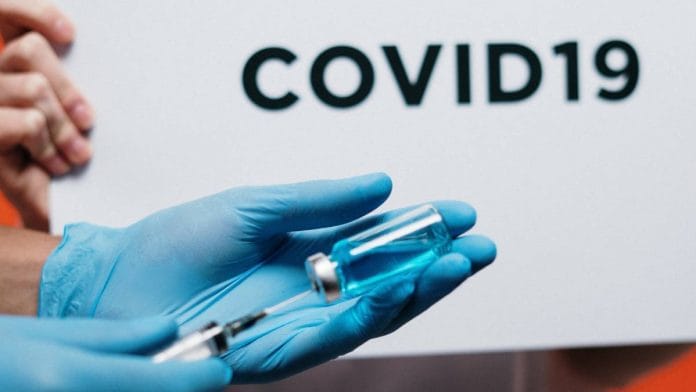Bengaluru: The endeavour to produce a coronavirus vaccine is the fastest, most intensive and the largest-scale collaborative effort ever the world has seen during a public health emergency or even for developing a vaccine.
There are hundreds of candidate vaccines currently in pre-clinical trials, many in Phase 1 and 2 trials, and nine in Phase 3 trials. Demonstrable success in Phase 3 will establish efficacy of the vaccine, which can then go on to be administered to the public.
With trials of the apparently most promising vaccine raising health concerns, ThePrint takes a look at the status of those leading the Covid vaccine race.
Also read: From Phase 0 to long-term study, a look at how long it actually takes to develop a vaccine
Oxford-AstraZeneca
The most promising candidate so far seems to be the University of Oxford’s collaboration with AstraZeneca and the Jenner Institute to produce the adenovirus vaccine ChAdOx1.
The vaccine produced strong antibody and T cell response during safety studies, and is currently in combined Phase 2 and 3 studies and Phase 3 studies in multiple countries, including South Africa, Brazil and the US, with over 10,000 volunteers.
Phase 3 trials in the UK and India were halted earlier this week after one participant developed transverse myelitis, an inflammation of the spinal cord. Serum Institute of India, which has been running the trials in India, has also been asked to stop recruitment of volunteers for Phase 2 and 3 trials. However, AstraZeneca announced Saturday it had received approval from the UK health regulator to resume trials in the country.
Moderna-NIH
Moderna’s vaccine is based on messenger RNA (mRNA), called mRNA-1273, and is being developed in partnership with the American National Institutes of Health. Phase 3 trials have enrolled 30,000 people in the US and began at the end of July. It is expected to be completed by the end of this month, and the company is already in talks with multiple countries for a vaccine rollout.
Preliminary results from the Phase 1 trials showed healthy participants, including the elderly, produced antibody and T cell responses. Moderna says it will roll out 500 million doses of the vaccine per year, beginning 2021.
BioNTech-Pfizer
The German company BioNTech, in collaboration with New York-based Pfizer and the China-based Fosun Pharma, is developing an mRNA vaccine called BNT162b2. The vaccine produced antibody and T cell responses in safety studies.
A combined Phase 2 and 3 trial was launched with 30,000 volunteers in the US, Argentina, Brazil, and Germany at the end of July. Pfizer signed a $2 billion contract with the US government to provide 100 million doses by December of 2020, if the vaccine is approved.
CanSino BIO
The Chinese company CanSino Biologics is developing the adenovirus vaccine Ad5-nCoV, with the country’s Academy of Military Medical Sciences. The company reported a strong immune response during Phase 2 trials, and the Chinese military has approved the use of the vaccine as a specially needed drug. Phase 3 trials have begun in Pakistan and Saudi Arabia. In August, the Russian company Petrovax announced that they launched Phase 3 trials as well.
Sinopharm-Wuhan Institute of Biological Products
The Sinopharm vaccine in collaboration with Wuhan Institute of Biological Products has undergone two preliminary randomised trials and is reported to have produced an antibody response. This is the only vaccine candidate that uses a whole inactivated virus.
It is also the only vaccine to be used to inoculate healthcare workers and other high risk groups. Its first Phase 3 trial began in the United Arab Emirates with 15,000 participants.
Other vaccines
In China, two vaccines — an inactivated vaccine from Sinovac Biotech (called CoronaVac), and another Sinopharm inactivated vaccine being developed by the Beijing Institute of Biological Products — are in Phase 3 trials.
Russia launched Phase 3 trials of the Gam-Covid-Vac, commercially known as Sputnik V, which is being developed by the Gamaleya Research Institute, a part of Russia’s Ministry of Health. Russian scientists have claimed that the Sputnik V vaccine triggered a response during Phase 1 and 2 trials, but the findings have come under scrutiny.
Zydus Cadila’s ZyCov-D vaccine is also in Phase 1 and 2 trials after it generated preliminary safety results.
The Murdoch Children’s Research Institute in Australia is also testing the BCG tuberculosis vaccine in Phase 3 BRACE trials to test for an immune response. There is limited evidence that the BCG vaccine is capable of inducing an immune response against pathogens other than the tuberculosis bacteria. About 10,000 participants will be recruited for this trial.
Some vaccines in Phase 2 have also triggered an immune response.
Homegrown Covaxin — being jointly developed by Bharat Biotech International Limited, National Institute of Virology, Pune, in collaboration with Indian Council of Medical Research — will begin Phase 2 trials this month.
Also read: Vaccine hesitancy growing in parts of world as people doubt effectiveness, Lancet study says







oh, come on.. sputnik v among “other vaccines”.. why mentioned in title though?
That is the state of Journalism today